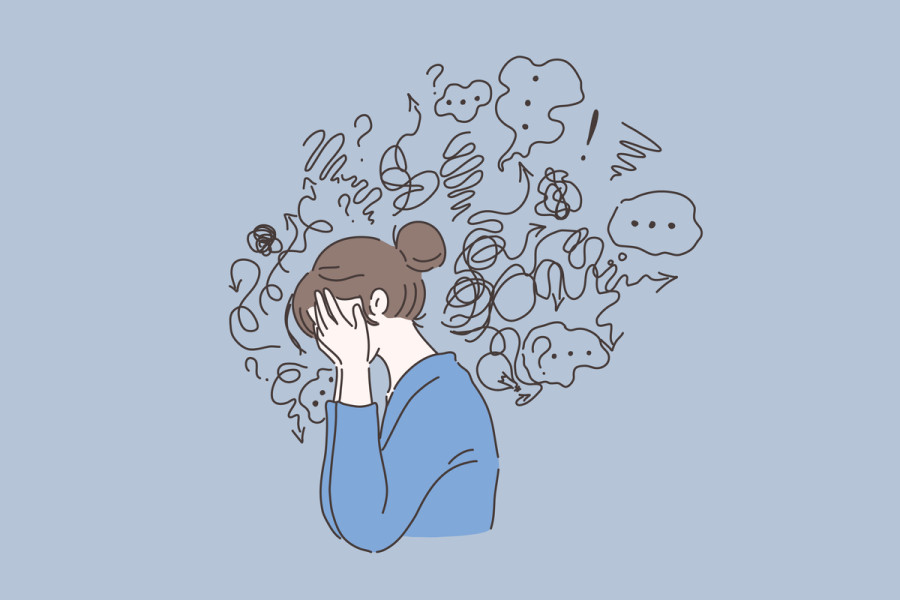Columns
Something on their minds
Society should offer support so that people facing mental health issues feel accepted.
Mimamsha Dhungel
The human body needs proper attention for its proper performance. So does one’s mind. Human health is contingent upon the treatment it receives in terms of diet, exercise and day-to-day well-being. Mental health, in particular, is a regular commitment towards a sound and peaceful lifestyle that comprises personal, social and spiritual balance. The advocacy for proper mental health is prominent in the world as people have realised how important it is for a healthy and happy life. Discussions regarding mental health have been acknowledged by many, yet the stigma surrounding it prevails in society.
When we talk about mental health, there are basically three theories regarding the etiology of mental illness—supernatural, somatogenic and psychogenic. The association of mental illness with demonic possession has been a common theme throughout history. The somatogenic theory recognises disruptions in physical wellbeing as a result of illness, genetic inheritance, brain damage or imbalance. The psychogenic theory points towards stressful and traumatic experiences, maladaptive learned associations and cognitions, or distorted perceptions.
Types of mental illnesses
The characterisation of every mental illness as madness has also kept proper knowledge about mental illness in obscurity. Mental illnesses can be anxiety disorders like obsessive-compulsive disorder (OCD), panic disorders, phobias or mood disorders such as depression, mania and bipolar disorder. It also includes post-traumatic stress disorders, personality disorders, eating disorders and psychotic disorders such as schizophrenia. The varieties of mental illnesses and proper knowledge about them is lacking in today’s society, which makes the task of addressing mental health issues a task in itself.
It is necessary to acknowledge that mental health issues can be faced by anyone from any walk of life. Teenagers are prone to depression, anxiety and eating disorders. They are the most vulnerable age group struggling with such issues. The media plays a very considerable role in affecting the young population. Social media and its portrayal of a certain lifestyle may promote negative experiences such as dissatisfaction with one’s own life or appearance. Beauty standards set by celebrities have propelled people to struggle with body image issues. Online harassment and bullying is another factor that affects a lot of social media users.
Mental health is an issue that is relevant to everyone. One might look content, happy and fulfilled yet struggling with an issue. A person who is socially anxious, isolated and alone is equally likely to be depressed as an outgoing, extroverted individual with a large social circle. There is a close link between a person’s environment and its reflection upon his or her mental health. A person growing up in a healthy family with people providing love, care and attention might be less likely to succumb to mental illness than a person brought up in an abusive environment with no emotional and social support. Emotional stability is key to sound mental health. One needs to be emotionally healthy to be able to maintain personal comfort and social relationships. To be able to handle stress, work-related expectations and social responsibility, one has to be emotionally happy and content. A person requires people to confide in. Friends and family support is inevitable. The extent of one’s pursuit of happiness is infinite. Such pursuits need to continue and succeed so that true happiness embellishes one’s life. The happiness that one feels is vital for emotional stability and contributes towards better mental health.
Due to lack of awareness and social acceptance, many people still stigmatise mental health and people suffering from it. Society’s perspective of an individual often affects their self-image and behaviour. It is important to inculcate proper knowledge about mental health among members of society. In school, we are taught sex education, personal health and hygiene, but we also need discourses on mental health. There has to be conversations about mental health among family members and friends so that a community full of aware and educated individuals can help build a safe space for all struggling with mental health issues.
Seek professional help
It is important to normalise seeking professional help when required. A lot of times, mental health issues build upon lack of professional help. Psychiatrists and psychologists are equipped with proper ways to help address mental health issues. Medication and therapy can help a person rehabilitate into society. As socially aware individuals, we need to understand how to help people struggling with mental health. A conversation with someone struggling personally with an issue can be a start. We need empathy while dealing with people. There has to be an understanding that no problem is big or small to start with. Something that might mean nothing to us might be bothering an individual to the core. We need to make people comfortable with us so that they can reach out when they need to. One can encourage someone struggling with mental health issues to seek professional help.
October 10 is celebrated as World Mental Health Day. This year's slogan is “Mental health care for all: Let’s make it a reality”. The theme is "Mental Health in an Unequal World". The world we live in currently faces the dire need to address mental health issues. With the coronavirus and the lockdown, and their impact on the general population, concerns regarding sound mental health have risen. This digital age that impacts almost all of our livelihoods has taken a toll on our mental health and personal wellbeing. The inequalities that exist in society due to race, ethnicity, sexual orientation and gender identity, and lack of respect for human rights, have triggered mental health issues among many people which need to be addressed. Conversations regarding mental health should be easy, and relevant discourses should be encouraged on many platforms. Mental health related issues should not be something that one suffers in silence. Society needs to be a safe space that provides support and assistance to all so that people suffering from mental health feel safe and accepted. Mental health should be embraced as an unavoidable part of our lives.




 9.7°C Kathmandu
9.7°C Kathmandu















